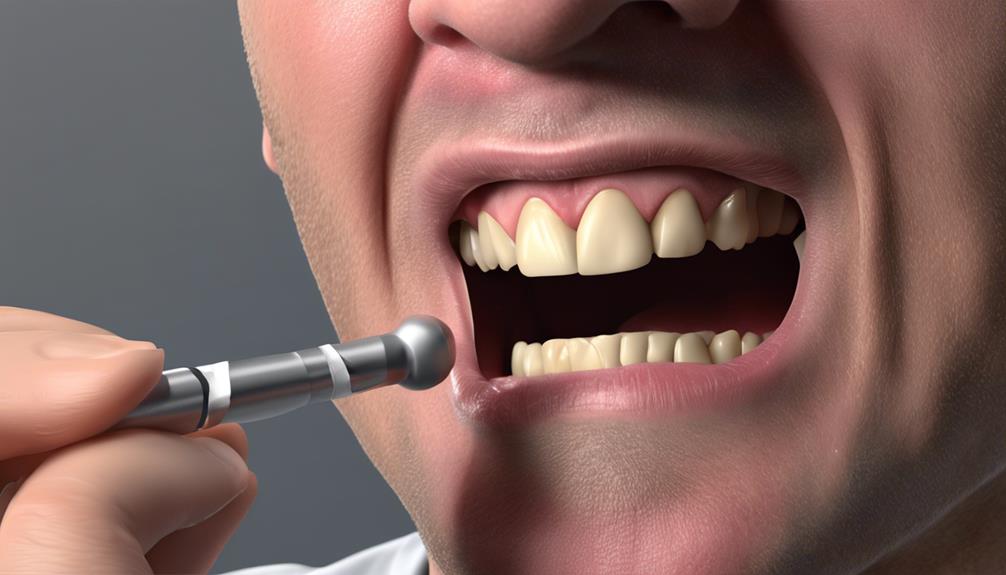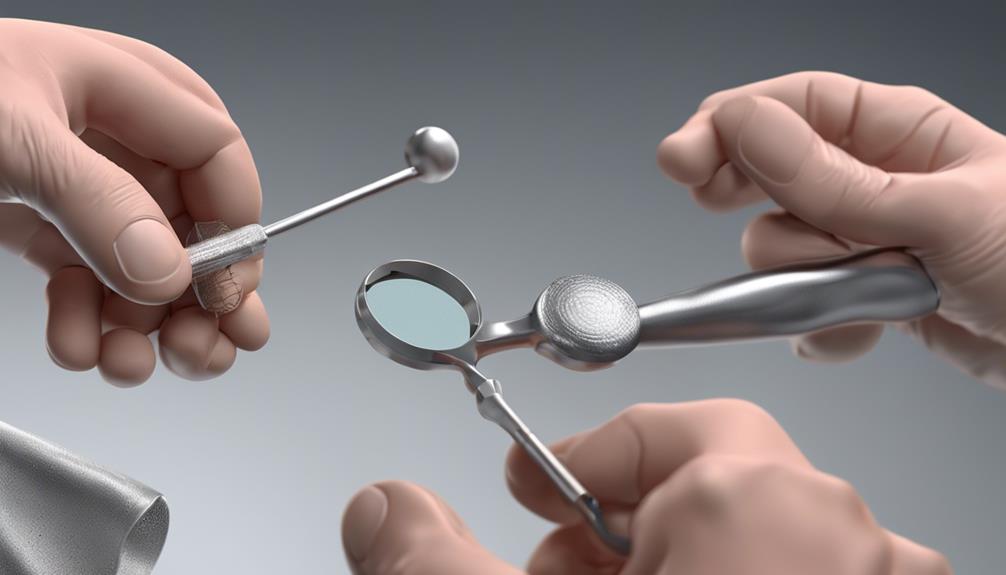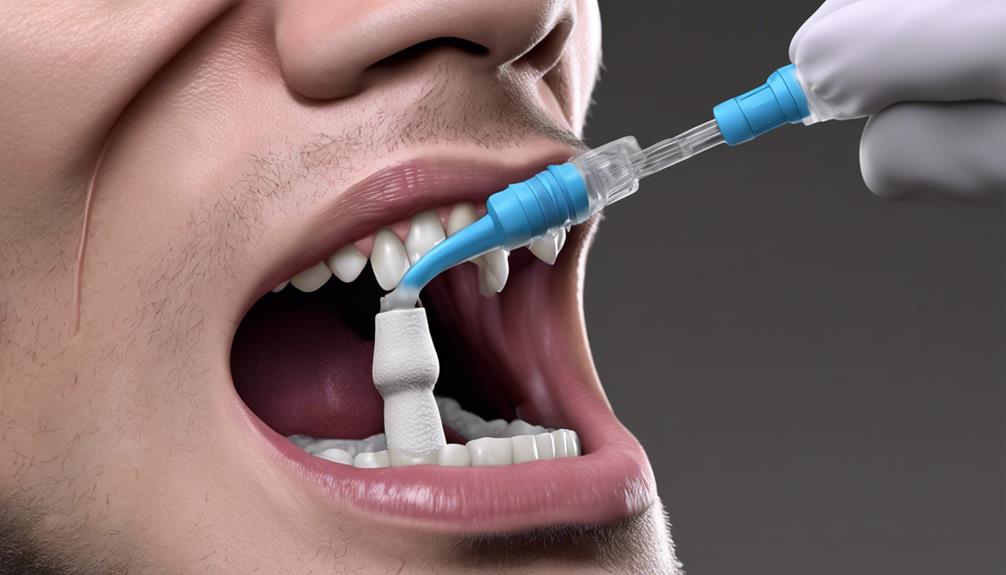When tackling stubborn tonsil stones causing bad breath and discomfort, utilizing a tonsil stone removal tool is essential. These tools help eliminate the stones effectively and safely, reducing the risk of infections. You can choose from various options like water flossers, cotton swabs, or professional devices, depending on your comfort level and budget. Employ natural remedies or seek medical procedures for larger stones. To prevent future occurrences, maintain good oral hygiene, a balanced diet, and stay hydrated. Remember, proper removal and prevention are vital for overall oral health.
Key Takeaways
- Consider surgical or non-invasive tools for effective tonsil stone removal.
- DIY tools like cotton swabs are inexpensive options for removing tonsil stones.
- Professional tonsil stone removal devices are available for a more specialized approach.
- Choose the right tool based on comfort, severity of stones, and budget.
- Safely extract tonsil stones using proper techniques and suitable tools.
Benefits of Using a Tonsil Stone Removal Tool

Using a tonsil stone removal tool can effectively and safely eliminate troublesome tonsil stones from the crevices of your tonsils. One of the primary health benefits of using a tonsil stone removal tool is that it helps prevent bad breath. Tonsil stones, also known as tonsilloliths, can often be a cause of persistent bad breath due to the bacteria and debris trapped in the tonsil crevices. By easily removing these stones with a specialized tool, you can greatly reduce bad breath and improve your overall oral hygiene.
Moreover, the easy removal process provided by a tonsil stone removal tool can help alleviate throat discomfort. Tonsil stones can sometimes cause a sore throat, difficulty swallowing, or a persistent feeling of something being stuck in your throat. By using a removal tool, you can quickly and efficiently extract these stones, relieving any discomfort or pain associated with their presence.
Additionally, the health benefits of using a tonsil stone removal tool extend to reducing the risk of infection. Tonsil stones can harbor harmful bacteria, leading to infections or inflammation in the tonsils. By regularly removing these stones with a proper tool, you can lower the chances of developing infections and maintain the health of your tonsils.
Types of Tonsil Stone Removal Tools
Various types of tools are available for effectively removing tonsil stones, each designed to cater to different preferences and needs. When it comes to removing tonsil stones, you have options ranging from surgical procedures to non-invasive methods, as well as DIY tools to professional devices. Here is a breakdown of the different types of tonsil stone removal tools:
| Type of Tool | Description | Pros | Cons |
|---|---|---|---|
| Surgical Options | Involves procedures like tonsillectomy | Effective for severe cases | Invasive, may require downtime |
| Non-invasive Methods | Water flossers, oral irrigators | Easy to use, minimally invasive | May not be as effective for large stones |
| DIY Tools | Cotton swabs, q-tips | Readily available, inexpensive | May not reach deep or be effective |
| Professional Devices | Tonsil stone removal tools | Designed specifically for tonsil stone removal | Higher cost, may require professional guidance |
It's essential to take into account your comfort level, the severity of your tonsil stones, and your budget when choosing the right tool for removing tonsil stones. Whether you opt for a surgical procedure, a non-invasive method, a DIY tool, or a professional device, make sure to prioritize safety and effectiveness in eliminating tonsil stones from your throat.
How to Safely Remove Tonsil Stones

To safely remove tonsil stones, it's essential to follow proper techniques and use appropriate tools for effective extraction. Tonsil stones, also known as tonsilloliths, can be bothersome and cause bad breath.
Here are some methods for safely removing them:
- Natural Remedies: One gentle way to remove tonsil stones is by using natural remedies. Gargling with salt water can help dislodge smaller stones and reduce the discomfort associated with them. Another natural method is to gently push the tonsil stones out with a cotton swab or your toothbrush.
- Medical Procedures: If natural remedies aren't effective or if you have larger tonsil stones that are causing significant issues, medical procedures may be necessary. One common procedure is manual removal by a healthcare professional using specialized tools. This method guarantees thorough extraction of the stones while minimizing the risk of injury to the tonsils.
Tips for Preventing Tonsil Stones
To prevent tonsil stones from forming, maintaining good oral hygiene is essential. Regularly brushing your teeth, tongue, and using mouthwash can help reduce the buildup of debris and bacteria that contribute to the formation of tonsil stones. Additionally, staying hydrated by drinking an adequate amount of water throughout the day can also help prevent the accumulation of materials in the tonsils that lead to these uncomfortable stones.
Here are some tips to help prevent tonsil stones:
| Preventive Measures | Description | Benefits |
|---|---|---|
| Dietary changes | Consuming a balanced diet rich in fruits and vegetables can help prevent tonsil stones by reducing the amount of debris that accumulates in the tonsils. | Helps maintain overall oral health and reduces the likelihood of tonsil stone formation. |
| Oral hygiene | Regularly brushing, flossing, and using an antimicrobial mouthwash can help keep the mouth clean and free of bacteria that contribute to tonsil stone formation. | Prevents the buildup of debris and bacteria in the tonsils. |
| Lifestyle habits | Avoiding smoking and excessive alcohol consumption can help prevent the development of tonsil stones by reducing the amount of toxins and bacteria in the mouth. | Promotes overall oral and general health. |
While these preventive measures can be effective for many individuals, in some cases, medical treatments such as tonsillectomy may be necessary for those who frequently suffer from tonsil stones despite following preventive measures.
Maintaining Oral Health After Removal

After the removal of tonsil stones, it's important to continue practicing good oral hygiene to prevent their recurrence and maintain overall oral health. In the post-removal care period, ensuring proper oral hygiene is vital. This includes regular brushing of teeth at least twice a day with a fluoride toothpaste to eliminate bacteria that may contribute to the formation of tonsil stones.
Flossing daily can also help in removing food particles and debris that could potentially lead to the development of new stones.
During the recovery period after tonsil stone removal, it's advisable to adhere to any diet restrictions recommended by your healthcare provider. Avoiding foods that are known to exacerbate the formation of tonsil stones, such as dairy products or sugary snacks, can be beneficial. Staying hydrated by drinking an adequate amount of water throughout the day is also essential to keep the mouth moist and prevent the accumulation of bacteria.
Maintaining a regular schedule of dental check-ups is another important aspect of post-removal care. Your dentist can monitor your oral health and provide guidance on how to prevent the recurrence of tonsil stones.
Conclusion
To sum up, using a tonsil stone removal tool can offer numerous benefits, including easy and safe removal of pesky tonsil stones.
With various types of tools available, it's important to choose the right one for your needs.
By following proper removal techniques and taking steps to prevent future tonsil stones, you can maintain good oral health and avoid discomfort associated with this common condition.
